| Listing 1 - 10 of 30 | << page >> |
Sort by
|
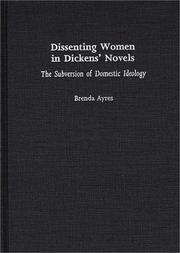
ISBN: 0313307636 Year: 1998 Publisher: Westport, Conn. London Greenwood Press
Abstract | Keywords | Export | Availability | Bookmark
 Loading...
Loading...Choose an application
- Reference Manager
- EndNote
- RefWorks (Direct export to RefWorks)
Book
ISBN: 9782343047461 2343047464 Year: 2014 Publisher: Paris: L'Harmattan,
Abstract | Keywords | Export | Availability | Bookmark
 Loading...
Loading...Choose an application
- Reference Manager
- EndNote
- RefWorks (Direct export to RefWorks)
En son étymologie, l'extravagance est une errance, une sortie de route, comme le délire, que le lexique latin lui préfère, est une sortie du sillon, et, en ce sens, elle trouve des résonances profondes dans l'imaginaire antique en perpétuelle tension entre l'écart et la norme, tant dans la définition de l'homme que dans les manières de raconter son histoire. Le colloque, dont ce livre réunit les actes, a exploré plusieurs manifestations de cette tension, essentiellement à travers le témoignage des textes littéraires. Au sein même de la bipolarité forte, il a mis en évidence la circulation entre les concepts de norme et d'écart, étant entendu que l'une et l'autre sont indissociablement liés dans un système du monde où l'extravagance participe à la bonne santé du corps social et à la quête du sens, comme en attestent, par exemple, les aberrations des Saturnales ou l'omniprésence de la marginalité dans la mythologie et l'expression du sacré. Parallèlement à ce volet anthropologique, le colloque a également fait valoir la pertinence du concept d'extravagance dans l'analyse des modes d'écriture antiques. Les oscillations de l'écart à la norme définissent, en effet, une part importante des figures du discours et de la syntaxe des récits dans la création littéraire de l'antiquité, sans compter que la mise en texte des personnages et évènements les connote d'une extravagance particulière par rapport à leur modèle, en lien avec le genre littéraire ou les positions idéologiques qui en rendent compte.
Conferences - Meetings --- Social norms in literature --- Deviant behavior in literature --- Conformity in literature --- Classical literature --- Themes, motives --- Classical literature - Themes, motives - Congresses --- Social norms in literature - Congresses --- Deviant behavior in literature - Congresses --- Conformity in literature - Congresses
Book
Year: 1988 Publisher: New York Knopf
Abstract | Keywords | Export | Availability | Bookmark
 Loading...
Loading...Choose an application
- Reference Manager
- EndNote
- RefWorks (Direct export to RefWorks)
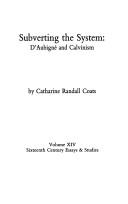
ISBN: 0940474166 9780940474161 Year: 1990 Volume: 14 Publisher: Kirksville (Mo.): Sixteenth century journal publ,
Abstract | Keywords | Export | Availability | Bookmark
 Loading...
Loading...Choose an application
- Reference Manager
- EndNote
- RefWorks (Direct export to RefWorks)
Book
ISBN: 1800109245 1783277602 Year: 2023 Publisher: Woodbridge, Suffolk ; Rochester, NY : Boydell Press,
Abstract | Keywords | Export | Availability | Bookmark
 Loading...
Loading...Choose an application
- Reference Manager
- EndNote
- RefWorks (Direct export to RefWorks)
Valuable new insights into the multi-layered and multi-directional relationship of law, literature, and social regulation in pre-Conquest English society. Pre-Conquest English law was among the most sophisticated in early medieval Europe. Composed largely in the vernacular, it played a crucial role in the evolution of early English identity and exercised a formative influence on the development of the Common Law. However, recent scholarship has also revealed the significant influence of these legal documents and ideas on other cultural domains, both modern and pre-modern. This collection explores the richness of pre-Conquest legal writing by looking beyond its traditional codified form. Drawing on methodologies ranging from traditional philology to legal and literary theory, and from a diverse selection of contributors offering a broad spectrum of disciplines, specialities and perspectives, the essays examine the intersection between traditional juridical texts - from law codes and charters to treatises and religious regulation - and a wide range of literary genres, including hagiography and heroic poetry. In doing so, they demonstrate that the boundary that has traditionally separated "law" from other modes of thought and writing is far more porous than hitherto realized. Overall, the volume yields valuable new insights into the multi-layered and multi-directional relationship of law, literature, and social regulation in pre-Conquest English society.
Law and literature. --- History. --- Great Britain. --- Literature and law --- Literature --- English literature --- Law and literature --- Social norms in literature. --- History and criticism. --- History
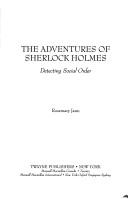
ISBN: 0805783857 Year: 1995 Publisher: New York (N.Y.) : Twayne,
Abstract | Keywords | Export | Availability | Bookmark
 Loading...
Loading...Choose an application
- Reference Manager
- EndNote
- RefWorks (Direct export to RefWorks)
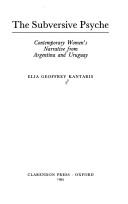
ISBN: 0198159021 Year: 1995 Publisher: Oxford : Clarendon press,
Abstract | Keywords | Export | Availability | Bookmark
 Loading...
Loading...Choose an application
- Reference Manager
- EndNote
- RefWorks (Direct export to RefWorks)
Argentine fiction --- Literature and society --- Narration (Rhetoric) --- Politics in literature. --- Sex role in literature. --- Social norms in literature. --- Uruguayan fiction --- Women and literature --- History and criticism. --- History
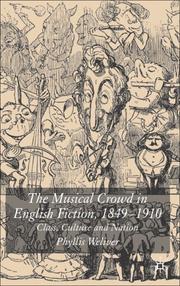
ISBN: 1403999945 Year: 2006 Publisher: New York : Palgrave Macmillan,
Abstract | Keywords | Export | Availability | Bookmark
 Loading...
Loading...Choose an application
- Reference Manager
- EndNote
- RefWorks (Direct export to RefWorks)
Examining innovations in audience behaviour, musical ensembles and mass-music movements, this book provides insight into how musical performances contributed to emerging ideas about class and national identity. Offering a fresh reading of bestselling fictional works of the day, Weliver draws upon crowd theory, climate theory, ethnology, science, music reviews and books by professional musicians to demonstrate how these discourses were mutually constitutive. This interdisciplinary undertaking will interest those working in the fields of English literature, musicology, social history and cultural studies.
Collective behavior in literature. --- English fiction --- Music and literature --- Music in literature. --- Music --- Social norms in literature. --- History and criticism --- History --- Social aspects
Book
ISBN: 3846760226 Year: 2016 Publisher: Paderborn : Wilhelm Fink Verlag,
Abstract | Keywords | Export | Availability | Bookmark
 Loading...
Loading...Choose an application
- Reference Manager
- EndNote
- RefWorks (Direct export to RefWorks)
Stellt das Phänomen der Abweichung bloß einen Ausdruck von Willkür dar, der das jeweilige Ordnungssystem gefährdet? Ist es dank dem mehrdimensionalen Sinngehalt des Begriffs nicht auch imstande, ein produktives Potenzial zu entfalten und als eine kulturelle Analysekategorie zu dienen? »Nur die widernatürliche Phantasie kann uns noch retten«, soll Goethe zu Eckermann gesagt und damit die positive Treibkraft der Devianz anerkannt haben. Obwohl immer wieder Versuche unternommen werden, Devianzen zu verbergen, zu beherrschen oder zu verleumden, löst die Auseinandersetzung mit »otherness« Prozesse aus, die schließlich eine neue Sicht- und Ausdrucksweise entfalten. Dies führt zu Befunden, die Abweichung als Treibmittel der Entwicklung von Literatur, Ästhetik, Wissenschaft und Gesellschaftsordnung ausweisen.
Social norms in literature --- Deviant behavior in literature --- Literature, Modern --- German literature --- Russian literature --- History and criticism --- Russian influences --- German influences
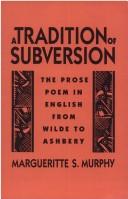
ISBN: 1122053185 058518674X 9780585186740 0870237810 9780870237812 9781122053181 Year: 1992 Publisher: Amherst University of Massachusetts press
Abstract | Keywords | Export | Availability | Bookmark
 Loading...
Loading...Choose an application
- Reference Manager
- EndNote
- RefWorks (Direct export to RefWorks)
From its inception in nineteenth-century France, the prose poem has embraced an aesthetic of shock and innovation rather than tradition and convention. In this suggestive study, Margueritte S. Murphy both explores the history of this genre in Anglo-American literature and provides a model for reading the prose poem, irrespective of language or national literature. Murphy argues that the prose poem is an inherently subversive genre, one that must perpetually undermine prosaic conventions in order to validate itself as authentically "other." At the same time, each prose poem must to some degree suggest a traditional prose genre in order to subvert it successfully. The prose poem is thus of special interest as a genre in which the traditional and the new are brought inevitably and continually into conflict. Beginning with a discussion of the French prose poem and its adoption in England by the Decadents, Murphy examines the effects of this association on later poets such as T.S. Eliot. She also explores the perception of the prose poem as an androgynous genre. Then, with a sensitivity to the sociopolitical nature of language, she draws on the work of Mikhail Bakhtin to illuminate the ideology of the genre and explore its subversive nature. The bulk of the book is devoted to insightful readings of William Carlos Williams's Kora in Hell, Gertrude Stein's Tender Buttons, and John Ashbery's Three Poems. As notable examples of the American prose poem, these works demonstrate the range of this genre's radical and experimental possibilities.
American prose literature --- American poetry --- Prose poems, American --- Social norms in literature. --- Dissenters in literature. --- Social norms in literature --- Dissenters in literature --- American Literature --- English --- Languages & Literatures --- American prose poems --- History and criticism. --- History and criticism --- Ashbery, John, --- Williams, William Carlos, --- Stein, Gertrude, --- Criticism and interpretation.
| Listing 1 - 10 of 30 | << page >> |
Sort by
|

 Search
Search Feedback
Feedback About UniCat
About UniCat  Help
Help News
News